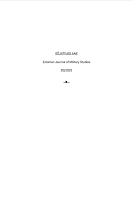PEACE POLICIES IN THE SHADOW OF THE WAR IN UKRAINE AND THE LIMITED POSSIBILITIES OF NON-VIOLENT POLICIES
PEACE POLICIES IN THE SHADOW OF THE WAR IN UKRAINE AND THE LIMITED POSSIBILITIES OF NON-VIOLENT POLICIES
Author(s): Egbert JahnSubject(s): Politics, Peace and Conflict Studies, Russian Aggression against Ukraine, Russian war against Ukraine
Published by: Kaitseväe Akadeemia (KVA)
Keywords: Ukraine; Russia; War; Military Stalemate; Armistice;
Summary/Abstract: The ceasefire in eastern Ukraine agreed in 2015 in Minsk did not put an end to the war in Europe. On 24 February 2022, Russia launched a full-scale military offensive aimed at “demilitarising” and “denazifying” Ukraine, i.e. establishing a regime closely aligned with Russia and ceding Ukrainian territories to the aggressor. Ever since, a military direction in internal politics has dominated in both the aggressor state and victim state, as well as the supportive policies of NATO, the EU, and other democratic partners of Ukraine. The vehement resistance of the Ukrainian army and population prevented the rapid capture of Kyiv and other large parts of the country. Since the sixth week of war, Russia has focused on conquering eastern and southern Ukraine. A very long war is now to be expected, in which neither side is likely to achieve its most lofty military aims. The peace policy (Friedenspolitik) has two aims. First and foremost, a ceasefire must be reached, and only then can a new international security apparatus and order of peace be conceivable. We can only expect to see any kind of fatigue in either party after hundreds of thousands of people fall victim to the war, and only then could we expect a ceasefire along the southeastern frontline in Ukraine – which line exactly is, today, impossible to determine. Such a ceasefire will likely be achieved by strong national-conservative politicians, while only a small contribution can be made by the peace movement. Thus, once again, a “frozen conflict” is expected along a changed line of military demarcation. It is unlikely that a democratic, peace-demanding popular movement would change the regime in Russia. The removal of Putin from the presidency by the Russian power elite is conceivable but would not fundamentally change the Putinist autocratic system, i.e. Russia will certainly not give up its positions in Crimea, nor is it likely in the Donbas either. The assumption that all post-communist countries will gradually become democratic after being integrated into the capitalist world economy and its institutions has proven to be wrong. Some countries have spawned new autocratic regimes and consider themselves threatened by Western democracies, which is why they ally with other autocracies. This will lead us to a new global conflict between political systems, which will be somewhat different from the historical East-West conflict. In it, new military demarcation lines are being drawn between democracies and autocracies. International politics is once again faced with the task of establishing a peaceful coexistence between them. To this end, this text1 will present a few seemingly feasible proposals.
Journal: Sõjateadlane
- Issue Year: 2023
- Issue No: 23
- Page Range: 53-94
- Page Count: 42
- Language: English

